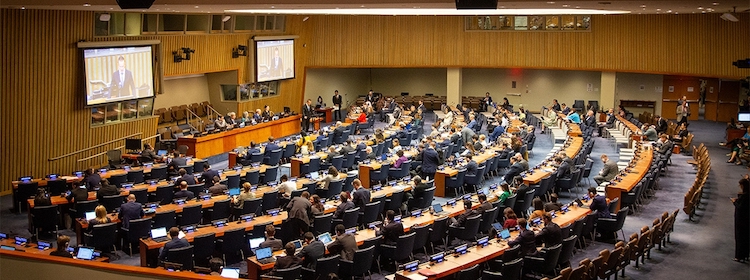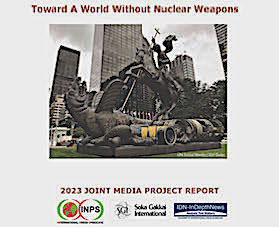By Thalif Deen
UNITED NATIONS | 1 November 2023 (IDN) — A decision by the Russian parliament to pass a bill on 18 October to revoke its ratification of the Comprehensive Test Ban Treaty (CTBT) has come under heavy fire.
Former UN Secretary-General Ban Ki-moon says he was “dismayed” by the Duma’s decision to revoke ratification of the CTBT. (P21) ITALIAN | JAPANESE
“This will further undermine the international arms control architecture and risks fracturing the global taboo against nuclear testing,” he said in a statement released on October 18, immediately following the decision by the Russian parliament.
“As the former Chair of the Comprehensive Nuclear-Test-Ban Treaty (CTBT) Preparatory Organization, I urge Russia and the other six nuclear-armed states who are not a party to the CTBT to refrain from taking any steps towards resuming nuclear testing”.
“At a time of growing international tensions and heightened threat of nuclear conflict, all leaders of nuclear-armed states must pursue dialogue and engagement.”
This is the only way to effectively manage nuclear risks and prevent the further erosion of global norms., said Ban, who is currently deputy chair of The Elders, a group of independent global leaders working for peace, justice, human rights, and a sustainable planet, founded by Nelson Mandela in 2007.
Deploring the decision of the Russian parliament, he urged all nuclear states to pursue dialogue and engagement at a time of heightened international tensions.
The international wire service Reuters reported on 6 October that Russia indicated that it was moving swiftly towards revoking its ratification of the CTBT after President Vladimir Putin held out the possibility of resuming nuclear testing.
Putin was quoted as saying that Russia’s nuclear doctrine—which sets out the conditions under which he would press the nuclear button—did not need updating, but was not yet ready to say whether or not Moscow needed to resume nuclear tests.
He said Russia could look at revoking ratification of the CTBT as the United States had signed but not ratified it.
According to a report in the New York Times on October 8, Putin was quoted as saying Russia had successfully tested a nuclear-powered cruise missile but “dangled the prospect that Russia may revoke its ratification of the CTBT”.
Meanwhile, the International Campaign to Abolish Nuclear Weapons (ICAN) said the Russian parliament’s bill to revoke its ratification of the CTBT, retains its cooperation with the treaty’s verification system and implementing organisation.
The law strikes Article 1 (on ratification) of the 2000 law, which Russia passed to ratify the treaty and outline its cooperation with the International Monitoring System and Comprehensive Test Ban Treaty Organization.
The CTBT, adopted in 1996, is the first international treaty to ban all nuclear tests. It has 187 states which have signed, and 178 which have ratified, but has not entered into force yet because of the failure of eight states, upon whose ratification the entry into force of the treaty depends: China, the Democratic People’s Republic of Korea, Egypt, India, Iran, Israel, Pakistan and the United States.
ICAN Executive Director Melissa Parke condemned the move, saying: “Russia must reverse this irresponsible decision immediately. International treaties, including the CTBT and the TPNW, are critical to making sure nuclear testing, which has harmed people’s health and spread lasting radioactive contamination, is not resumed. Russia must remain fully committed to the CTBT and all countries that have not joined the CTBT and the TPNW should do so as a matter of urgency.”
Mirroring the “manner of the United States
ICAN said the move by the Russian Duma came after explicit calls from Russian President Vladimir Putin to withdraw from the treaty. On Friday, 6 October, President Putin stated that, in regards to the CTBT, he sees it fit to “mirror the manner of the United States,” which has signed but not ratified the treaty, and revoke Russia’s ratification.
He added that “this is a question for the State Duma [lower house of the Federal Assembly of Russia] deputies. In theory, this ratification could be revoked.”
On 9 October , the Duma’s Committee on International Affairs was instructed to contact the Russian Foreign Ministry to look into the issue of withdrawing the ratification of the CTBT.
As a signatory to the Treaty, Russia still retains the responsibility not to engage in any behaviour that would defeat the Treaty’s object and purpose, according to Article 18 of the Vienna Convention on the Law of Treaties, said ICAN.
Nuclear testing has had devastating humanitarian and environmental consequences around the world. The former Soviet Union’s hundreds of nuclear tests in the Arctic and across Eastern Europe and Asia left a legacy of medical, psychological and socio-economic trauma, displacement of Indigenous peoples and contaminated the environment with radiation for generations to come, according to ICAN. [IDN-InDepthNews – 01 November 2023]
Photo: At the 13th Conference on Facilitating Entry into Force of the Comprehensive Nuclear-Test-Ban Treaty (Article XIV Conference) at the United Nations in New York on 22 September 2023, global leaders reaffirmed their commitment to making the CTBT legally binding on an international scale and bringing an end to nuclear testing once and for all. Credit: CTBTO













